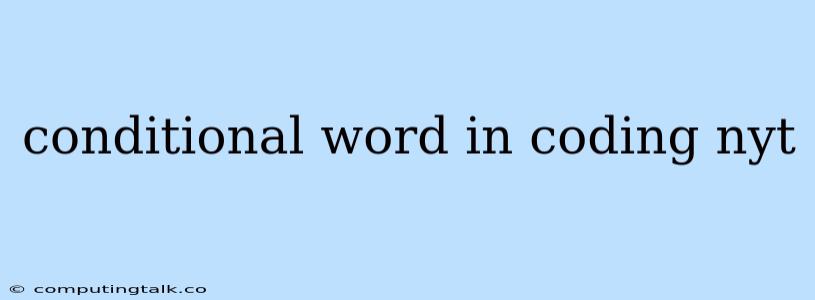Conditional statements are a fundamental part of programming, allowing your code to make decisions and execute different blocks of code based on specific conditions. In essence, they provide the logic and flow control that enable your programs to respond dynamically to changing circumstances.
What are Conditional Statements?
Conditional statements, also known as conditional expressions or if-then statements, are programming constructs that allow your code to execute different blocks of code based on the evaluation of a specific condition. They are essential for building complex programs that can adapt to different situations and user inputs.
Why are Conditional Statements Crucial?
Imagine a program that needs to display a message based on a user's age. You would use a conditional statement to check the user's age and display a different message depending on whether they are under 18, between 18 and 65, or over 65.
The Building Blocks of Conditional Statements
The core of conditional statements lies in their boolean expressions - these expressions evaluate to either true or false. Let's explore the most common types of conditional statements:
If Statement:
The simplest form of a conditional statement is the if statement. It evaluates a single condition. If the condition is true, the code block within the if statement is executed; otherwise, it is skipped.
if age < 18:
print("You are a minor.")
Else Statement:
An else statement provides an alternative block of code to be executed if the if condition is false. This allows you to handle different scenarios.
if age < 18:
print("You are a minor.")
else:
print("You are an adult.")
Elif Statement:
The elif statement (short for "else if") allows you to chain multiple conditions together. If the first if condition is false, the elif conditions are checked sequentially until one evaluates to true. If none of the conditions are true, the else block is executed (if present).
if age < 18:
print("You are a minor.")
elif age >= 18 and age < 65:
print("You are an adult.")
else:
print("You are a senior citizen.")
Nested Conditional Statements:
You can nest conditional statements within each other to create more complex decision-making structures.
if age < 18:
print("You are a minor.")
else:
if age >= 18 and age < 65:
print("You are an adult.")
else:
print("You are a senior citizen.")
Examples of Conditional Statements in Action
- User Authentication: Checking if a username and password match before granting access to a system.
- Game Development: Determining game logic based on player actions and game state.
- Web Development: Displaying different content based on user roles or browser capabilities.
- Data Analysis: Filtering data based on specific criteria.
Best Practices for Using Conditional Statements
- Keep conditions concise and clear: Avoid overly complex conditions to make your code more readable.
- Use meaningful variable names: Choose names that reflect the purpose of the variables involved in the condition.
- Indentation: Use consistent indentation to clearly distinguish different blocks of code within conditional statements.
- Avoid unnecessary nesting: While nesting can be useful, excessive nesting can make your code hard to understand. Try to simplify conditions whenever possible.
Conclusion
Conditional statements are the backbone of decision-making in programming. They enable your code to adapt to diverse situations and user input, creating dynamic and interactive programs. By understanding how to effectively utilize if, else, and elif statements, you can build robust and sophisticated applications.
